
 |
| Torâh | Haphtârâh | Âmar Ribi Yᵊhoshua | Mᵊnorat ha-Maor |
|---|---|---|---|
![]() The rabbis concede that neither they nor the Sages know any satisfying reason for the laws of ka•shᵊr•ut′. They don't have answers to too many important questions.
The rabbis concede that neither they nor the Sages know any satisfying reason for the laws of ka•shᵊr•ut′. They don't have answers to too many important questions.
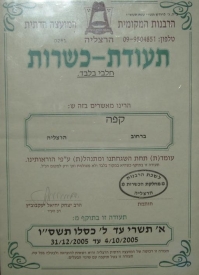 |
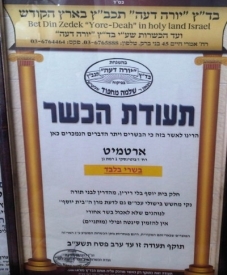 |
Those who have completed our khavruta already know how Tor•âh′ employs one of the laws of ka•shᵊr•ut′, not boiling a kid in its mother's milk, as a mnemonic analogy prohibiting us from reminding a geir of his mother culture. This breakthrough in understanding the rationale underlying ka•shᵊr•ut′, however, implies similar parallels in the other laws of ka•shᵊr•ut′.
Thus, we are led to explore similar parallels in the other laws of ka•shᵊr•ut′, listed in this week's pâ•râsh•âh′. Tor•âh′ lists six categories of contaminants:
Interestingly, we are permitted to eat a specific exception (certain species of locusts), which must also have implications. These represent the nᵊviy•im′. é‑‑ä doesn't permit the world to lack a Nâ•vi′. Rather, the world has lost the ability to identify a legitimate Nâ•vi′.
The tragedy is that the meaning underlying eating kasheir has been lost. The divorce between Tor•âh′ and reality is the primary reason that 90+% of Jews have estranged themselves from rabbinicism.
The solution is to rediscover and restore the logical reasons for keeping Tor•âh′ . Rabbis are afraid to do that, and decry any effort, because they don't have the answers.
From the Pâr•âh′ A•dum•âh′ to ka•shᵊr•ut′, the Nᵊtzâr•im′—the Second Coming of Rib′i Yᵊho•shu′a in spirit—are the only ones whom é‑‑ä has given the answers to why; and, like so many other answers, we're the first to publish them. Everyone else plagiarizes these answers from us. If you're intelligent and genuinely seeking truth, that will demonstrate to you who is the earthly group properly connected to, and therein endorsed by, é‑‑ä.
 |
 These two words, ãÌÈøÉùÑ ãÌÈøÇùÑ (dâ•roshꞋ dâ•rashꞋ ), mark the exact halfway mark in the words of Tor•âh′ . ãÌÈøÉùÑ ãÌÈøÇùÑ, forms an emphatic doublet meaning "inquiring absolutely" (lit. "inquiring he inquired"). In an era in which ignoratio elenchi, ad hominem, petitio principii, post hoc ergo propter hoc, ad ignorantiam, ex falso quodlibet, outright lᵊshon′ hâ-râ′ and even mo•tzi′ sheim râ are widely accepted as de rigueur "logic,"—sometimes especially in kha•reid•i′ circles, this dispute between Mosh•ëh′ and Aharon should be studied as the paradigm for all ôÌÄìÀôÌåÌì Tor•âh′ (disputation—lit. "peppering"—of Tor•âh′).
These two words, ãÌÈøÉùÑ ãÌÈøÇùÑ (dâ•roshꞋ dâ•rashꞋ ), mark the exact halfway mark in the words of Tor•âh′ . ãÌÈøÉùÑ ãÌÈøÇùÑ, forms an emphatic doublet meaning "inquiring absolutely" (lit. "inquiring he inquired"). In an era in which ignoratio elenchi, ad hominem, petitio principii, post hoc ergo propter hoc, ad ignorantiam, ex falso quodlibet, outright lᵊshon′ hâ-râ′ and even mo•tzi′ sheim râ are widely accepted as de rigueur "logic,"—sometimes especially in kha•reid•i′ circles, this dispute between Mosh•ëh′ and Aharon should be studied as the paradigm for all ôÌÄìÀôÌåÌì Tor•âh′ (disputation—lit. "peppering"—of Tor•âh′).
We find none of these vulgar tactics—tactics that are unerring indicators of intellectual, moral and spiritual bankruptcy—applied by either to the other. Rather, the ôÌÄìÀôÌåÌì conducted between Mosh•ëh′ and A •ha•ronꞋ preserved the integrity and dignity of both.
In this case, A •ha•ronꞋ 's two sons had just died, making A •ha•ronꞋ an àåÉðÅï.
"Although the Ko•heinꞋ Gâ•dolꞋ is required to perform his [Beit ha-Miq•dâshꞋ ] service even as an [àåÉðÅï], other Ko•han•imꞋ are forbidden to do so. The period of the [Mish•kânꞋ ]'s inauguration was an exception to this rule, in that all Ko•han•imꞋ were required to continue their sacrificial service, but the extent of this dispensation became a matter of controversy between Mosh•ëhꞋ and A •ha•ronꞋ in [this] passage. The question was this: Were the Ko•han•imꞋ permitted to eat from all of the offerings on that day, or were they permitted to eat only some of the offerings, as explained below?
The answer to this question would vary with the nature of the offering, because two kinds of offerings were brought on that day. Some of the offerings were ÷ÈãÀùÑÅé ùÑÈòÈä, or offerings that were brought exclusively for that occasion, and would never again be repeated, while others were ÷ÈãÀùÑÅé ãÌåÉøåÉú, or offerings that were part of the regular [Mish•kânꞋ ] service, and would be brought in the future, as well. [Mosh•ëhꞋ ] had commanded that the [îÌÄðÀçÈä] be eaten (v. 12), but did this command extend to other offerings as well? Logic might dictate that the mourning Ko•han•imꞋ were to eat only the offerings that could never be brought again, because they were similar to the [îÌÄðÀçÈä]…" (Vayikra, The Artscroll Tanach Series, p 155-6)
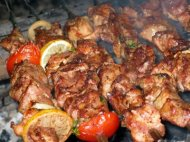 A•har•on′, however, reasoned that these two kinds of qor•bân•ot′ were not comparable. Accordingly, he held that since Mosh•ëh′'s direct mi•tzᵊw•âh′ specified the îÌÄðÀçÈä (viz.,
÷ÀçåÌ
àÆú
äÇîÌÄðÀçÈä, v. 12), which was ÷ÈãÀùÑÅé ùÑÈòÈä, he apparently concluded that it should apply only to the male goats of Nakh•shonꞋ (bƏ-Mi•dƏbarꞋ 7.13) and the inauguration, which were ÷ÈãÀùÑÅé ùÑÈòÈä. Since the male goat of Rosh KhoꞋ dësh was ÷ÈãÀùÑÅé ãÌåÉøåÉú, A•har•on′ held that it was forbidden for him and his sons in mourning to eat its meat. Note the selflessness of his decision.
A•har•on′, however, reasoned that these two kinds of qor•bân•ot′ were not comparable. Accordingly, he held that since Mosh•ëh′'s direct mi•tzᵊw•âh′ specified the îÌÄðÀçÈä (viz.,
÷ÀçåÌ
àÆú
äÇîÌÄðÀçÈä, v. 12), which was ÷ÈãÀùÑÅé ùÑÈòÈä, he apparently concluded that it should apply only to the male goats of Nakh•shonꞋ (bƏ-Mi•dƏbarꞋ 7.13) and the inauguration, which were ÷ÈãÀùÑÅé ùÑÈòÈä. Since the male goat of Rosh KhoꞋ dësh was ÷ÈãÀùÑÅé ãÌåÉøåÉú, A•har•on′ held that it was forbidden for him and his sons in mourning to eat its meat. Note the selflessness of his decision.
R. Tza•doqꞋ ha-Ko•hein′ notes that this is the first place in the Tor•âh′ where we find the classic exercise of the Tor•âh′ shë-bᵊ•al′ pëh, in which reasoning—logic—is used to define the parameters of Tor•âh′ shë-bi•khᵊtâv′. (Artscroll "Vayikra [sic]," III(a).158-159).
 |
This ôøùä begins åéäé áéåí äùîéðé.
 |
| Photo taken from Har Karkom (foreground): valley where festival of Golden Calf likely occurred. Har Kharoz on opposite side of valley. (photo harkarkom.com). |
The Artscroll editors note (Vayikra [sic] III(a), p. 139) that the òÅâÆì
áÌÆï-áÌÈ÷Èø (9.2), as the designated çÇèÌÈàú, is directly related to the misstep of the golden calf-mask—sacrificing precisely that which was formerly (in Egypt) deemed a god – Hathor.
Additionally, analysis of the instances in which a òÅâÆì áÌÆï-áÌÈ÷Èø is required can all be traced back to this origin.
Primarily, the òÅâÆì áÌÆï-áÌÈ÷Èø required for a ha-Ko•hein′, and commemorates this first çÇèÌÈàú stemming from the misstep of the golden calf- mask.
Instructively, the only other instance of òÅâÆì áÌÆï-áÌÈ÷Èø, outside of Rōsh KhōꞋdësh and the çÇâÌÄéí, is for communal idolatry. There is no reason to think that the theme of the òÅâÆì áÌÆï-áÌÈ÷Èø type of òåÉìÈä qor•bân•ot′ on Rōsh KhōꞋdësh and the Khaj•imꞋ are any different.
The çÇèÌÈàú is a symbolic killing of that to which we have wrongfully submitted ourselves—which we have wrongfully made a god, an idol. The òåÉìÈä, which can only occur when the need for a çÇèÌÈàú has been satisfied, symbolizes the next step: ascending the ñËìÌÇí
éÇòÂ÷Éá.
in úÌÀôÄìÌÈä.
This can be seen in the sequence leading to the àÅùÑ îÄìÄÌôÀðÅé é--ä (cf. pâ•suq′ 24, review also last week's pâ•râsh•âh′).
First A•har•on′ ha-Ko•hein′ ha-Ja•dol′ offered the çÇèÌÈàú for himself and the other Kohan•im′,
The Kohan•im′, then being acceptable, offered the çÇèÌÈàú for the rest of Israel.
Finally, upon properly presenting the òåÉìÈä for Israel upon the îÄæÀáÌÅçÇ, we read úöà àÅùÑ îìôðé é--ä.
From the point that é‑‑ä endorsed the îÄæÀáÌÅçÇ by issuing àÅùÑ symbolizing His ùÑÀëÄéðÈä and His øåÌçÇ äÇ÷ÉãÆùÑ in the camp of éÄùÒÀøÈàÅì, no àÅùÑ æÈøÈä (cf. 10.1-2) was permitted to be introduced on the îÄæÀáÌÅçÇ.
æÈøÈä is the Hebrew adjective equivalent to "idolatrous"—òÂáåÉãÈä æÈøÈä (abbreviated in English as AZ) = idolatry. "AZ" is also the abbreviation for a tractate (Ma•sëk′ët A•vod•âh′ Zâr•âh′) of Tal•mud′.
Two lessons we must learn from the account of Nadav and Avihu are
holiness + arrogance and presumptuosness = sanctimony is lethal, and
rebellion against the authority appointed by é‑‑ä is lethal.
(Cf. also the story of touching the àÂøåÉï äÈòÅãåÌú – even to steady it and prevent it from falling.
 |
Be a Nᵊtzâr•im′ "Saint"— How do you become a Nᵊtzâr•im′ "Saint"? Same way as other Tor•âhꞋ-observant Jews become "saints"—÷ÀãåÉùÑÄéí, one of the Hebrew terms translated by Christians as "saints"—are self made, by their own decisions, their own free will and their own determination and perseverance; at every point until one's last breath, it's always a "work in progress".
Self made?!? Check it out. 11.44 (in the Hebrew, of course): When you do your utmost to keep Tor•âhꞋ, "For I am é‑‑ä your ël•oh•imꞋ, åÀäÄúÀ÷ÇãÌÄùÑÀúÌÆí and you m.pl. shall be ÷ÀãåÉùÑÄéí, because I am ÷ÈãåÉùÑ.
Everyone who does their utmost in practicing Tor•âh′-observance according to Ha•lâkh•âh′ (defined as, and only including, Pᵊrush•imꞋ-heritage Jews and geir•im′) is a self-made "saint"!
Ha•lâkh•âh′ requires, inter alia that you give ma•asᵊr•ot′ and tzᵊdâq•âh′, observe the laws of ka•shᵊr•ut′ and other mi•tzᵊw•ot′, fast on the fast days, and make a çÇâ to Yᵊrushâlayim for a çÇâ (Pës′akh, Shâv•u•ot′ or Suk•ot′), as often as your health and finances permit. Then (cf. Mi•shᵊl•ei′ Shᵊlom•oh′ 28.9 and The Nᵊtzârim Reconstruction of Hebrew Matitᵊyâhu (NHM, in English)![]() note 21.22.2) you should pray the tᵊphil•otꞋ in the úÌÄëÌìÇàì (the
ñÄãÌåÌø úÌÅéîÈðÄé), in Hebrew, within the Ha•lâkh•âhꞋ prayed by all observant Jews world-wide,
note 21.22.2) you should pray the tᵊphil•otꞋ in the úÌÄëÌìÇàì (the
ñÄãÌåÌø úÌÅéîÈðÄé), in Hebrew, within the Ha•lâkh•âhꞋ prayed by all observant Jews world-wide,
five times each day,
where viable, pray with Pᵊrush•imꞋ-heritage Jews in a Beit-ha-Kᵊnës′ët on Shab•ât′ and çÇâÌÄéí.
For a more complete description of what's required, see our Syllabus (Kha•vᵊr•utꞋâ link in the appropriate ministry).
Be a self-made saint today! Be a (÷ãåù(ä—as é‑‑ä instructed.
Every ta•lᵊmid′ (talmidah) must learn these things that each needs to live their life everyday rather than ignoring everyday needs to run off after purely academic questions and their own curiosity (eyes). Gently correct the spiritual infants who try to wear the mantle of a Sage before they can even read the Ta•na"kh′ or pray the Si•dur′ (Hebrew—with understanding; not English or transliteration). Each must put their own life in accordance with Ha•lâkh•âh′ before pursuing its great mysteries. The alternative, so frequently criticized by Rib′i Yᵊho•shu′a, is hypocrisy.
Mohammed, and hence Islam, derived four of their five pillars of faith from the Ha•lâkh•âh′ of the Jews set forth in Tor•âh′—millennia before Mohammed was born! Of the five pillars of Islam, only the first, which proclaims Mohammed as the agent of "Alah," is original to Islam. The rest were plagiarized and perverted from Tor•âh′. Tor•âh′ certainly defines Mohammed as a false prophet.
Like Christianity , Islam is totally dependent for its claims to authenticity upon ancient Jewish documents, especially the Ta•na"kh′. Like Christianity, Islam also contradicts the same Judaic documents upon which its claims to authenticity rest.
Without the ancient Judaic documents as its basis, Christianity shrinks to nothing but a comparatively recent form of pagan Roman Hellenism—which derived from Greek and, before that, Egyptian idolatry—syncretized with Displacement Theology and Selective Tor•âh′-observance, Yet, Christianity's claim to have sprouted from Judaism carries with it the Tor•âh′-prohibition of any leader or doctrine that advocates transgressing Tor•âh′—as Christianity does. Hence, Christianity's claim to be based in Tor•âh′ inherently brings with it self-contradiction and the seeds of Christianity's own self-destruction.
Without ancient Judaic documents, upon which Islam bases its claims of authenticity, Islam is a second-order, even more modern (7th century C.E.), Arab plagiarism of Judaism, in which Mohammed syncretized Judaic Ha•lâkh•ot′ he knew from the Jewish community of Yathrib-Medina ("Islam," EJ, 9.92-105) to construct a deliberately contradictory set of laws that would generate enmity between Arabs from Jews. Examples include Mohammed's changing the direction of prayers, replacing the fast of the 10thmonth with that of Ramadan, changing Shab•ât′ from the Jews' 7th day (and from the apostate Christians sun-god-day) to 6thday, etc. Islam owes some other aspects of its origins to Christianity , particularly "some descriptions of the Last Judgment and of eschatological events" (ibid.).
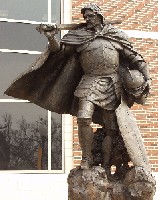 |
| Christian Crusader |
 |
| Hamas Islamic terrorist |
Both Islam and Christianity suffer from the same conundrum. Neither are dependent upon Ta•na"kh′ for their origins while neither can point to their own ancient documents independent of Ta•na"kh′ to validate their claims to independent ancient historicity. If the ancient Judaic documents were wrong, then both Christianity and Islam, which depend on the ancient Judaic documents for their basis, are wrong. If the ancient Judaic documents are right, then the ancient Judaic documents define both Christianity and Islam as wrong! Either way, they're wrong! This is why Christianity, and later Islam, have been compelled to attempt to forcibly wrest all connections to Tor•âh′ from its origins and its original people in order to claim authority to "reinterpret" it in a way that "prophesies" their own religion displacing Israel and the Jews. Thus, there are only two possible outcomes: annihilation of the Jews or education of Christians and Muslims to historical documentation, logic and Tor•âh′.
Because Islam views Mohammed as a mortal human prophet while Christianity views their Jesus as divine, Islam is infinitely closer than Christianity to the Way of é‑‑ä.
10.1— And sons of A•har•on′, Nadav and Avihu, each took his censer and put fire in it, and put incense in it, and made an approach-offering before é‑‑ä of àÅùÑ æÈøÈä, which He (é‑‑ä) had not ordered-as-a-mi•tzᵊw•âh′. What is an àÅùÑ æÈøÈä? How is an àÅùÑ æÈøÈä different from the àÅùÑ on the îÄæÀáÌÅçÇ?
"And Mosh•ëh′ and A•har•on′ came to the àÉäÆì îåÉòÅã, then [and] they went out and blessed the kindred, and the ëÌÈáåÉã é‑‑ä was caused to be seen by all of the kindred. Then an àÅùÑ went forth from before é‑‑ä and consumed the òåÉìÈä and the çÂìÈáÄéí (on the îÄæÀáÌÅçÇ) and all of the kindred éÈÌøÉðÌåÌ and fell down on their faces" (9.23-24).
That the àÅùÑ of the îÄæÀáÌÅçÇ came down from the heavens is also confirmed in Ta•lᵊmudꞋ (Ma•sëkꞋët Yom•âꞋ 21b). This holy àÅùÑ was kept burning from the time of Mosh•ëhꞋ until it was transferred to the Beit ha-Mi•qᵊdâshꞋ hâ-Rish•onꞋ of ShᵊlomꞋoh ha-MëlꞋëkh (Ma•sëkꞋët Zᵊvâkh•imꞋ 61b) and it continued to bum until the reign of Mᵊnash•ëhꞋ (Ya•lᵊq•utꞋ, Mᵊlâkh•imꞋ 187). The fire in the Beit ha-Mi•qᵊdâshꞋ ha-Shein•iꞋ, by contrast, was kindled by human hands. ("Fire," EJ, 6.1304).
The ordinary (profane / khol), supposedly divine and magic, fire of Hellenist Greek Olympus, the fire of the modem Olympics, is a counterfeit of the holy àÅùÑ of Har Sin•ai′.
It is ìÀäÇáãÄéì the àÅùÑ é‑‑ä from the ordinary àÅùÑ æÈøÈä that the kindling of àÅùÑ by human hands—çÉì, i.e., àÅùÑ æÈøÈä—is forbidden on Shab•ât′.
Notice that the ëÌÈáåÉã é‑‑ä was seen by all of the kindred, not one, or even an elite, holy mystic(s).
 |
A •ha•ronꞋ and his sons had just spent 7 days making themselves holy. This was the eighth day.
9.2 – ÷Çç-ìÀêÈ, òÅâÆì áÌÆï-áÌÈ÷Èø ìÀçÇèÈàú; åÀàÇéÄì ìÀòÉìÈä úÌÀîÄéîÄí; åÀäÇ÷ÀøÅá ìÄôÀðÅé é--ä:
It is not clear in the English, but explicit in the Hebrew, that
an òÅâÆì áÌÆï-áÌÈ÷Èø was deemed to become ìÀçÇèÈàú ("misstep" being defined by Tor•âh′)
a ram was deemed to become ìÀòÉìÈä
both were required in order to become úÌÀîÄéîÄí (see last week) and
all of these together were necessary conditions to approach near, or converge with, the Presence of é‑‑ä.
An òÅâÆì could be the male calf of almost any kâ•sheir′ farm-herd livestock. This pâ•suq′, then, specifies a particular kind of male calf: a áÌÆï-áÌÈ÷Èø.
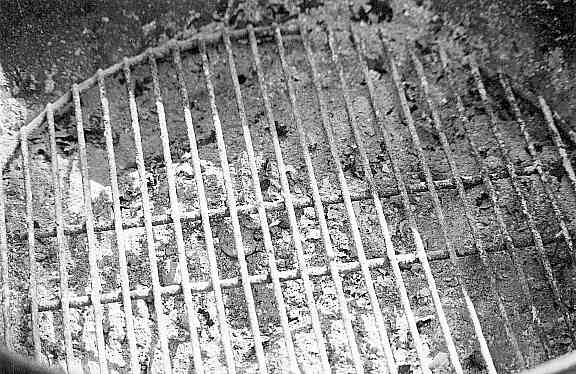 The raison d'être of the sacrifice system was punitive, not supernatural. Requiring the owner of a herd to sacrifice one of his herd was a punitive measure, like a judge assessing a heavy monetary fine (in a society that seems not to have relied much on imprisonment as a penalty). An additional advantage of a blood sacrifice were subtle nuances, looking in the eyes of a calf being killed on account of your transgression of Tor•âhꞋ , whose blood was draining from its body, that no monetary payment can imitate. Only in the Hebrew do we begin to see how our tᵊphil•otꞋ (consider again Mi•shᵊl•ei′ Shᵊlom•oh′ 28.9 in this light) and our nëphꞋ ësh can ascend, like the smoke from the sacrifice representing it, and converge with é‑‑ä, leaving behind the ãÌÆùÑÆï of our a•veir•ot′ against Tor•âh′ . This gets back to how an imperfect human can converge with a Perfect Creator-Singularity without bringing our imperfection into the convergence, which would pose the impossibility of contaminating Him and, thereby, rendering Him imperfect.
The raison d'être of the sacrifice system was punitive, not supernatural. Requiring the owner of a herd to sacrifice one of his herd was a punitive measure, like a judge assessing a heavy monetary fine (in a society that seems not to have relied much on imprisonment as a penalty). An additional advantage of a blood sacrifice were subtle nuances, looking in the eyes of a calf being killed on account of your transgression of Tor•âhꞋ , whose blood was draining from its body, that no monetary payment can imitate. Only in the Hebrew do we begin to see how our tᵊphil•otꞋ (consider again Mi•shᵊl•ei′ Shᵊlom•oh′ 28.9 in this light) and our nëphꞋ ësh can ascend, like the smoke from the sacrifice representing it, and converge with é‑‑ä, leaving behind the ãÌÆùÑÆï of our a•veir•ot′ against Tor•âh′ . This gets back to how an imperfect human can converge with a Perfect Creator-Singularity without bringing our imperfection into the convergence, which would pose the impossibility of contaminating Him and, thereby, rendering Him imperfect.
Everything to do with the Eternal Attributes of é‑‑ä is extra-universal—necessarily non-physical; i.e., spiritual. Accordingly, Yᵊkhëz•qeilꞋ ha-Nâ•viꞋ declared (37.25) that:
How can this deceased mortal, ãÈåÄã (Nâ•siꞋ Dâ•widꞋ ha-MëlꞋ ëkh; Yᵊkhëz•qeilꞋ 34.20-24), officiate ìÀòåÉìÈí (eternally)?!?
In describing an eternal scene, Yᵊkhëz•qeilꞋ ha-Nâ•viꞋ can only refer to a non-mortal, non-physical (i.e., "heavenly") scene; a spiritual process providing eternal ki•purꞋ in an eternal—ergo, spiritual—Beit ha-Miq•dâshꞋ ha-Shᵊlish•iꞋ beyond the heavens.
We find the úÌÇáÀðÄéú for this spiritual process in this week's pâ•râsh•âhꞋ , in the officiation of the Ko•han•imꞋ , another earthly úÌÇáÀðÄéú representing an eternal—spiritual—component: disposing of the a•veir•ot′ of Tor•âh′, reducing them to ãÌÆùÑÆï, then removing them from the Presence of é‑‑ä, thus permitting the tᵊphil•otꞋ and nᵊphâsh•otꞋ of the Yir•atꞋ é‑‑ä to converge into the Presence of é‑‑ä—as encoded in the Qᵊdush•âhꞋ .
Most major Sages have identified the Nâ•siꞋ Dâ•widꞋ ha-MëlꞋ ëkh as representing the Mâ•shi′akh. Necessarily, then, Yᵊkhëz•qeilꞋ ha-Nâ•viꞋ dictated that the Mâ•shi′akh has to have an eternal component. However, whereas the Hellenist Romans adopted the idolatrous Christian doctrine of a half-divine, half-mortal demigod prohibited by Tor•âhꞋ as their vision of such eternal component, the Tor•âhꞋ -compatible solution can only refer to the afterlife of a deceased mortal Mâ•shi′akh—which means that Tor•âhꞋ implies an afterlife.
Thus, the earthly, physical, qor•bân′ úÌÇáÀðÄéú illustrates how, in the spiritual (eternal) realm, the Mâ•shiꞋ akh Bën-Dâ•widꞋ will eternally oversee the spiritual process that provides eternal ki•purꞋ for Yir•atꞋ é‑‑ä (synonym equivalent to Yi•sᵊ•râ•eilꞋ ) by disposing of the a•veir•ot′ of Tor•âh′, reducing them to a void ãÌÆùÑÆï, removed from the Presence of é‑‑ä, thus permitting the tᵊphil•otꞋ and nᵊphâsh•otꞋ of the Yir•atꞋ é‑‑ä to converge into the Presence of é‑‑ä—as encoded in the Qᵊdush•âhꞋ .
It is, and has always been, through this spiritual (non-physical, eternal) provision of the Mâ•shiꞋ akh Bën-Dâ•widꞋ , never the direct product of the physical, earthly úÌÇáÀðÄéú, that ki•purꞋ is made for ha-am (this pâ•râsh•âhꞋ , wa-Yi•qᵊr•âꞋ 9.7)—Yir•atꞋ é‑‑ä, not goy•imꞋ (which includes everyone not doing their utmost to keep Tor•âhꞋ )!
Time, whether looking in faith forward in time anticipating the manifestation of the earthly úÌÇáÀðÄéú or looking back into history, has always been irrelevant. The provision has always been the spiritual process described by Yᵊkhëz•qeilꞋ ha-Nâ•viꞋ . The úÌÇáÀðÄéú and its spiritual actualization in the extra-universal Realm have always been two mutually exclusive items. Physical processes, rituals, in the physical universe cannot operate mechanically in a non-physical Realm. Yᵊkhëz•qeilꞋ 's spiritual process, never the earthly úÌÇáÀðÄéú of physical blood sacrifices, has always been the only provision of ki•purꞋ —in the time of Mosh′ëh just as it is now!
Encoded in the Shᵊm•aꞋ is ò"ã—"The Way" of é‑‑ä. Reflecting its Author, His Way does not change (Malâkh•iꞋ 3.6; Tᵊhil•imꞋ 89.35).
Because ò"ã of é‑‑ä does not change we must strive to recover ò"ã as it was at Har Sin•ai′ when handed down to Mosh•ëhꞋ and restored again by the Mâ•shi′akh with all of its Ha•lâkh•âh′—neither the Hellenist-Romanized Displacement Theology counterfeit embracing selective observance and assimilation, nor a Medieval Europeanized version—nor a modern counterfeit pseudo-"Netzarim" or "Nazarene" Displacement Theology embracing selective observance or assimilation among goy•imꞋ (Christians).
And what result does é‑‑ä promise?
9.6 – æÆä äÇãÌÈáÈø, àÂùÑÆø-öÄåÌÈä é--ä úÌÇòÂùÒåÌ; åÀéÅøÈà àÂìÅéëÆí ëÌÀáåÉã é--ä:
Find ëÌÈáåÉã é‑‑ä analyzed in NHM![]() (5.16.2).
(5.16.2).
 |
9.4— "'for today é‑‑ä will appear to you." 9.6— "This is the saying/thing that é‑‑ä has ordered-as-a-mi•tzᵊw•âh′ that you will do, and the Kᵊvod é‑‑ä shall appear to you."
The fulfillment of these promises is found in 9.24 (below). Since é‑‑ä is unchanging (Ma·lâkh·i′ 3.6 and Tᵊhil•im′ 89.35), there is no escaping the conclusion that we must expect the same today. The difference is only in the medium through which He manifests Himself. Whether through the Mâ•shi′akh or through the Shᵊkhin•âh′ fire, the prerequisite, now as then, remains Tor•âh′-observance.

This was not a manifestation visible only to a select holy few, as some modern "sages" claim to be able to see. 9.24—"And a fire went out from before é‑‑ä and consumed (lit. "ate") the ol•âh′ and the khalav•im′ (intestinal fats) on the Mi•zᵊbeiꞋakh. And when all of the kindred saw it they were jubilant and fell on their faces." This is the holy fire of é‑‑ä, as opposed to the human-kindled, "strange" fire offered by Nadav and Avihu (10.1-2). The holy fire was kept burning until the reign of Mᵊnasheh (see last week). It is this holy fire—recalling the sᵊrâph•imꞋ , the Shᵊkhin•âh′ and the Mâ•shi′akh—that is commemorated in the bonfires of L"g la-O′mër.
This pâ•râsh•âh′ enumerates what is kâ•sheir′ to eat. Seafood, for example, is not kâ•sheir′ unless it has both fins and scales. The reason for observing ka•shᵊr•ut′ is given in pâ•suq′ 11.44. We are enjoined to use this criteria "to make a distinction between the unclean and the clean, and between the animal that may be eaten and the animal that may not be eaten."
 |
9.24— "And fire went out from before é‑‑ä and consumed the ascendance [offering] and äçìáéí (ha-khalav•im′; the intestinal-fats) on the Mi•zᵊbeiꞋakh." Cf. Mᵊlakh•im′ Aleph 18.38-39.
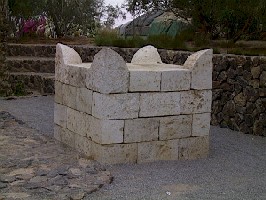 Horned Altar, Tel Beer-Sheva |
No one, including archaeologists, offers a reasonable explanation for why the ancients, in many civilizations, fashioned "horns" on their mi•zᵊbeiꞋakh (altar).
In pâ•râsh•atꞋ Ki Ti•saꞋ, when Mosh•ëhꞋ descends from Har Sin•aiꞋ with the second set of tablets of the A•sërꞋët ha-Di•bᵊr•otꞋ states that:
÷øï òåø ôðéå (qaran, or panayv; beamed, [the] skin of his face"). The verb qaran, however, can be understood as "radiate," and is related to the qeren (same spelling in Hebrew), the "horn" on the mi•zᵊbeiꞋakh. The term is probably related via the ancient artistic method of conveying a "beaming" face—particularly the sun-god (culminating in identical depictions of Yeshu)—as an aura (halo) of beams (horns) radiating from the head. This reasoning has been distorted to excuse Michelangelo, who sculpted two horns on his statue of "Moses," as a result of which many people are brought up under the viciously misojudaic misconception that Jews have horns, and that the reason we wear kipot and hats is to hide these horns. However, this doesn't explain why the same mistake is never made about Yeshu.
The meaning of qeren, horn, on the mi•zᵊbeiꞋakh is not clear itself. Protrusions, known to be qerenot, have been found on various altars by archaeologists. But it is not at all clear what these "horns" were used for or what they may have symbolized.
Some commentators have suggested that animals were somehow tied to these qerenot. Such commentators clearly have never seen ancient altars unearthed by archeologists. Since the qerenot lack holes or ridges to attach ropes or cords, their speculation isn't viable. Perhaps qeren, even related to the mi•zᵊbeiꞋakh, refers more to a "beam" or "ray" radiating from the mi•zᵊbeiꞋakh than to a "horn" on an animal or a musical instrument.
With respect to altars, one may recall that the fires of Israeli altars were ignited by fire coming down from é‑‑ä, and that the mi•zᵊbeiꞋakh in the Beit-ha-Mi•qᵊdâsh′ was shit•im′ (acacia) wood overlaid with copper or brass. The qerenot were also made of shit•im′ wood overlaid with copper or brass, on top of the highest mountain in the area of Yᵊrushâlayim.
Eiliyahu ha-Nâ•vi′ built his mi•zᵊbeiꞋakh on top of Har Karmel (pop. Carmel) in Kheiphah (corrupted to "Haifa"), the highest mountain in the Kheiphah area. Eil•i•yâh′u's mi•zᵊbeiꞋakh was also ignited by fire coming down from é‑‑ä. Though this event occurred toward the end of a drought, dry lightning is not unheard of and a cloud—presumably followed by more clouds, rain and lightning—was reported.
Perhaps the qerenot of the mi•zᵊbeiꞋakh, overlaid with copper or brass, were always intended as a kind of lightning rod radiating from each corner of the mi•zᵊbeiꞋakh toward the heavens!
Thus, qeren may have had the connotation of the radiating of a beam (modern "bolt"), of lightning from earliest times. Interestingly, until very recently lightning was thought to radiate down from the sky to earth. The latest lightning research has demonstrated that at least sometimes it's the exact opposite: lightning sometimes emerges from the ground and "beams" skyward into the clouds' as perhaps it was perceived by the ancients. If this can be established, then instead of referring to the "horns of the mi•zᵊbeiꞋakh," we should more accurately refer to the "beams radiating from the mi•zᵊbeiꞋakh."
In the case of Mosh′ëh, qeren may have described a beaming or radiating face, perhaps even suggesting eyes flashing like lightning.
Certainly, qaran in Ki Tisa did not mean "growing horns."
 |
![]()
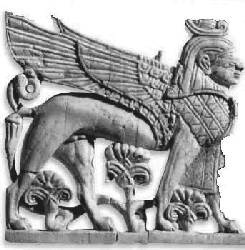 |
| Kᵊruv, Assyria B.C.E. 9th or 8th century Ivory |
In the Haphtâr•âh′, é‑‑ä is described as He "who sits upon äÇëÌÀøËáÄéí" (corrupted to "cherubim," Shᵊmu•eilꞋ Beit 6.2). In a play on words, the next pâ•suq′ begins åÇéÌÇøÀëÌÄáåÌ.
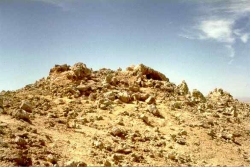 |
No one knows what a ëÌÀøåÌá (corrupted to "cherub") looked like. Almost certainly, the ancients didn't agree from culture to culture. The most ancient depictions are very similar to the Hor-em-akht ("Horus on the horizon"), the Egyptian guardian against demons protecting the pyramids—Hellenized, centuries later, to the entirely unrelated and misleading Greek term "sphinx." Virtually all depictions show the body as a winged-quadruped, usually a lion. There is less agreement about the face. The Hor-em-akht shows a man's face. In other depictions, the face varies especially.
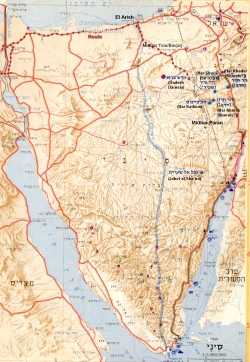 |
All scholars of any repute know that the traditional site of St Catherines in the southern Sin•ai′ peninsula is not the true Har Sin•ai′. Connecting this phrase with a possible site of Har Sin•ai′ is possible because of the ground work of archaeologist Emanuel Anati, who argues compellingly that Har Kar•komꞋ, in the Israeli NëgꞋëv, is the authentic ancient site of Har Sin•aiꞋ. Har Kar•komꞋ is approximately 112 km SSW of the southern tip of Yâm ha-MëlꞋakh, not far from the archeological ruins of Qâ•deishꞋ Bar•neiꞋa.
 |
![]()
| Tor•âh′ | Translation | Mid•râsh′ Rib′i Yᵊho•shu′a: NHM |
NHM |
||||||
|---|---|---|---|---|---|---|---|---|---|
| |||||||||
| |||||||||
| |||||||||
 |
![]()
wa-Yiq•râ′ 10.6—After é‑‑ä had struck-dead two of Aha•ron′'s sons (Nâ•dâv′ and Av•i•hu′ ), Mosh•ëh′ forbade Aha•ron′ from neglecting his hair (i.e., letting it grow wildly) åÌáÄâÀãÅéëÆí ìÉà-úÄôÀøÉîåÌ, a metonym for mourning.
There are only 2 other instances in Tor•âh′ of the verb ôøí; and only one other (wa-Yiq•râ′ 21.10) that pertains to a Ko•hein′ Gâ•dol′, likewise prohibiting him from rending his garment (mourning). (The remaining passage refers to one having tzâ•ra′at.)
Aha•ron′'s two sons were stuck dead because they offered àÅùÑ æÈøÈä In the Bible, the term æÈøÈä almost always refers to a pagan—strange—god; an altar of a strange god, a fire [usually from the altar] of a strange god, a woman of a strange god, etc. The term for idolatry in Hebrew is a•vod•âh′ zâr•âh′.
We may conclude from these facts that a Ko•hein′ Gâ•dol′ is prohibited from mourning—rending his garment—in cases of a•vod•âh′ zâr•âh′.
We know from khâr•bat′ Qum•rân′ documents (e.g., CD, 4Q MMT (Miq•sat′ Ma•as•ëh′ ha-Tor•âh′), et al.) that, from the time of Yeho•shu′a ("Jason") Bën-Shim•on′ II Bën-Tza•doq′, [1] the office of Ko•hein′ Gâ•dol′ was purchased from the Roman occupiers by whomever had their favor and the money regardless of their genealogy, [2] the Ko•hein′ Gâ•dol′ often were not even genealogically Ko•hein′ at all and [3] these Hellenist Tzᵊdoq•im′ priests controlling the Beit ha-Miq•dâsh′ were popularly derided by the Qum•rân′ Tzᵊdoq•im′ and Pᵊrush•im′ as Ko•han•ei′ hâ-Resh′a.
Corroborating this, in addition to Tal•mud′ corroborations that these phonies convened on Shab•ât′ and Yom Tov, NHM![]() 26.65 informs us of the phony "Chief Kohein" who condemned RibiYehoshua. Contrary to the Torah dictum, upon hearing RIbiYehoshua: "Then the Pseudo-Tzedoqi Chief Kohein tore his garment, saying, 'He has spoken blasphemy.' "
26.65 informs us of the phony "Chief Kohein" who condemned RibiYehoshua. Contrary to the Torah dictum, upon hearing RIbiYehoshua: "Then the Pseudo-Tzedoqi Chief Kohein tore his garment, saying, 'He has spoken blasphemy.' "
Only a learned Jew, educated in Torah and Talmud, would have the necessary knowledge to recognize that the Ko•hein′ Gâ•dol′ was transgressing Tor•âh′ by rending his garment no less than recruiting and accepting false witnesses and convening on a Khag.
wa-Yiq•râ′ 11.4 – Tor•âh′ makes it explicit that both chewing cud and split hooves are required for an animal to be kâ•sheir′, pointing out that the camel lacks the second attribute. That camels fail the standard of kash•rut′ also makes explicit that one may not be selective in observance; respecting one aspect but not the other.
NHM![]() 23.24 – If Rib′i Yᵊho•shu′a had meant to emphasize the tâ•reiph′ nature, he would certainly have cited a pig. The significance of citing a camel is that it meets one standard of kâ•sheir′. Citing camel emphasized the selective observance that typified the hypocritical and sanctimonious Hellenist Kohan•im′. While there's no implication the Hellenist Kohan•im′ ate camel, the example emphasized how, when it suited them, they "reinterpreted" whatever they wished to be kâ•sheir′.
23.24 – If Rib′i Yᵊho•shu′a had meant to emphasize the tâ•reiph′ nature, he would certainly have cited a pig. The significance of citing a camel is that it meets one standard of kâ•sheir′. Citing camel emphasized the selective observance that typified the hypocritical and sanctimonious Hellenist Kohan•im′. While there's no implication the Hellenist Kohan•im′ ate camel, the example emphasized how, when it suited them, they "reinterpreted" whatever they wished to be kâ•sheir′.
I remember, decades back, when I was a Christian I went to a Hal Lindsay movie; I think it was probably The Late, Great Planet Earth. At the time, the Christian world touted Hal Lindsay as a top international Christian teacher. He showed an actor playing "Elijah" scavenging the rocky beaches of the Mediterranean collecting clams and muscles—shellfish for his dinner (for those equally ignorant of Tor•âh′: all shellfish are tâ•reiph′). I remember thinking, even way back then, "How disgustingly ignorant even the most touted Christian leaders are of the Judaism that Yᵊho•shu′a lived and taught!"
wa-Yiq•râ′ 11.21-22 Perhaps surprisingly, however, a certain species of locusts are kâ•sheir′. According to Tor•âh′, as interpreted by No•sakh′ Teimân•i′, one variety of locust, àÇøÀáÆÌä, along with 3 of its subspecies (or stages: yellow, spotted gray and white locusts), is kâ•sheir′.
NHM![]() 3.4 documents that the àÇøÀáÆÌä was one of the main dietary staples of Yokhâ•nân′ 'ha-Mat•bil′' Ben--Zᵊkhar•yâh′ ha-Ko•hein′.
3.4 documents that the àÇøÀáÆÌä was one of the main dietary staples of Yokhâ•nân′ 'ha-Mat•bil′' Ben--Zᵊkhar•yâh′ ha-Ko•hein′.
 |
The laws of ka•shᵊr•ut′ were designed to maintain a Havdâl•âh′ between those who live Tor•âh′ and those who don't. Consequently, it raised serious questions when Rib′i Yᵊho•shu′a dined with Jews of questionable repute.
"Upon his reclining at supper in the house [of Ma•ti•tᵊyâhꞋu ha-Lei•wi′, a tax-gouger who worked for the Romans and, therefore, considered by Jews to be a traitor], it became that, look' many turncoat-tax-gougers and wicked men, having come, were reclining with Yᵊho•shu′a and his ta•lᵊmid•im′. Having seen it, those of the [probably Herodian-Boethusian or Shammai] Rabbinic-Pᵊrush•im′ sect of Judaism who advocated that Ha•lâkh•âh′ must be exclusively oral said to [Yᵊho•shu′a's talmidim, 'Why does your Rib′i dine with turncoat-tax-gougers and wicked men?'" (NHM![]() 9.10-11).
9.10-11).
•mar′ Rib′i Yᵊho•shu′a: "Those who are healthy have no need of a doctor. Rather, those who are afflicted with evil need the doctor'" (NHM![]() 9.12).
9.12).
Rib′i Yᵊho•shu′a's reply is highly instructive, defining those who don't practice Tor•âh′ as spiritually sick and those who have the remedy, Tor•âh′ , as spiritual doctors. It's certainly true that doctors take all known measures to ensure that they don't become contaminated or infected and join the sick. However, in order to heal the sick, the doctor must tend the sick, care for them and treat them. The laws of ka•shᵊr•ut′ were designed to impose Havdâl•âh′ between those who live Tor•âh′ and those who don't. But, Rib′i Yᵊho•shu′a deftly demonstrates, the laws of ka•shᵊr•ut′ aren't intended to preclude spiritual doctors from healing the spiritually sick.
With this reply, Rib′i Yᵊho•shu′a also confirms that, in his opinion, it is those who live Tor•âh′ who are the doctors and those who aren't living Tor•âh′ who are the spiritually sick! "Those who have ears to hear, let them hear!"
 |
![]()
It is a clear and well-known dâ•vâr′ that, according to foods [note: this excludes târeiph], every dâ•vâr′ will be such for feeding the body. Therefore, ha-Qâ•dosh′, Bâ•rukh′ Hu, in compassion concerning the Bᵊnei-No′akh, permitted them beasts, beings, fowl and fish.
However, [this was] according to what they were able to be fed from the produce of hâ-Â′rëtz, like it was from the creation of man until that time. Hence, His creations are the food of man, in his being, from the produce of hâ-Â′rëtz. Like animals that don't speak, this won't be food for feasting so much as to perpetuate the body; further, the blood won't be seemly so much as it will contest the vitality of the nëph′ësh to become intelligent. Therefore, Tor•âh′ instructs man to eat, and to be fed by, other animals.
It was found that it was his will, that everything would feed on the thing that is below it, and the combinations of the world were found to be orderly. The sources draw and feed from four elements, and plants [draw and feed from] the sources and the elements. Animals that don't talk [draw and feed] from the sources, elements and plants. An animal that talks feeds off and uses those that don't talk and plants and sources and elements. Also, the mind that is in the body feeds and uses and exists as an animal that talks, which feeds off all the other things and it is in his power and reach and actions that things come to happen. It is found that all things become food for their surroundings, those who are above them, until one they go from uplifting to uplifting all the way up.
And when it was The Creator's will to separate us from the peoples to be qᵊdosh•im′ and to give us a Tor•âh′ that is qᵊdosh•âh′, and mi•tzᵊw•ot′ and khuq•im′ and mi•shᵊpât•im′ that are tzadiq•im′, and to make us tâ•hor′ from the filth of the snake, which is the befoulment of the lusts, and to make us a smart and wise people; and when he saw that there is food that produces blood which is murky and thick and tâm•ei′ like it is, and that there is food that produces blood that is pure and clean and tâ•hor′ like it is—He separated us through his Tor•âh′ from a few forbidden foods that he prohibitted for a few reasons. And Bârukh knows hidden things and before Him the reason behind everything is revealed, for not in vain did He prohibit them to His people which He chose.
It appears to the eyes that He prohibitted animal fat and blood even [if it came from] the tâ•hor′ [animals], for they clog the heart. He prohibitted the animals and the birds of prey, for it seems that they dare to prey on their own. He prohibited the hare and hyrax and pig and the likes, because they clog the paths of intelligence. He prohibited fish that don't have a fin and scales, for they grow and feed in murky water. He prohibited varmints of the earth and water, for they bring about a variety of hard and bad diseases. At the end, the reason for everything is revealed before Him, and concerning all of them He said: "Do not abominate your souls through the beast and the bird" (wa-Yi•qᵊr•â′ 20.25). He revealed that all these things are the prohibited, abominable and repulsive and make bad blood ready for a few calamities and the abominate the body and soul.
Because that the blood of man becomes the drop of the seed, which is the foundations and building [block] of the newly born from that connection, it is found that like the food of the fathers, such shall be the nature of the boys. Maybe it is because of this that the Tor•âh′ placed that pâ•râsh•âh′ of forbidden foods in close proximity to the pâ•suq′ (6) "lᵊ-hav•dil′ between the tâm•ei′ and between the tâ•hor′" etc. (ibid, 11.47) close to it: "A woman that will be inseminated" (ibid 12.2), to teach us, that even though the filthy food causes murky blood when he eats it and damages him, more than that, he is damaging and destructing the seed that drop brings forth, upon which all his foundations are built on. Thus, the pâ•râsh•âh′ about afflictions was in close proximity on another side, to inform us that if a person were lᵊ-hav•dil′ himself from the bad foods, he would have decent and tâ•hor′ boys, and if not, then great and hard afflictions would renew upon him and on them, on behalf of the drop of seed that was from the blood of the abominable food.
Even though Tor•âh′ forbade a few prohibited foods and set aside a few things which are allowed, there is a great difference between the allowed, in health and in strength and in anything, as the wise of the nature wrote. If it were not for the Tor•âh′ that, in it's compassion, did not want to decree a decree that they could not withstand, until because of His love to Yi•sᵊr•â•eil′—in all the things that he prohibited them from, because sometimes people lust to eat them, he allowed them things that are similar to them; so that their nëph′ësh, which is lusting, isn't left with the impression and worry that when, for the same reason, a sickness might come to man. Like the doctors said; Thus, He allowed them similar foods, as they said in Ma•sëk′ët Khul•in′, për′ëq 'All of the Meat' (109b): Yalta [Rav Nakhmân's wife] said to Rav Nakhmân: All that ha-Qâ•dosh′, Bâ•rukh′ Hu, forbade us, against that he also allowed us [something similar]. He forbade the fat of a beast, [yet] permitted fat of a [kâ•sheir′] livestock; forbade pig, [yet] permitted the [similar-tasting] brain of Nile shibut-fish; forbade vulture, [yet] permitted the tongue of the [similar-tasting] Nile shibut-fish; forbade nid•âh′ blood [90 days after birth of a baby girl], [yet] permitted blood of to•har′ [40 days after birth of a boy]; Forbade the wife of a man, [yet] permitted a divorcee while her [former] husband is still alive; forbade the wife of a brother, [yet] permitted a levirate marriage; Forbade a goy′âh, [yet] permitted a beautiful woman—as it is to eat meat with its fat. Rav Nakhmân said to her (to his attendant): Give her an udder on a skewer [that has the taste of both milk and meat]. All this was in His mercy on Yi•sᵊr•â•eil′, that even though they are qᵊdosh•im′, because they are made of matter and [have] shape and everyone has a lusting force that desires to eat and taste of every food, and it is the nature of humans that lust more after things that they are warned about, Thus, He allowed [Yisraeil] similar things [to those things which are forbidden] to settle and rest their intentions.
But the mind of the wise is left, in those that chose the straight way and wish to be tᵊhor•im′ and Pᵊrush•im′, that they despise even a bit of the things which are allowed [but] that are not so worthy for the health of the body, for the work of the Creator and to clean the blood and to clear the mind, so that they reach the virtue of the qᵊdosh•im′, people with a [well-known and respected] name. Because one of the branches that the thing hangs on is in virtue of the foods, as the wise of nature have already said, that the animal that the smell was drawn from, her food [the animal smells of the grass it eats, which is odoriferous]. It is found that like the nature of the food, thus the body of the feeder shall be continued, even though it has already been created and grown in another nature. All the moreso the food of the mother and the father, that from them comes their blood and the blood turns into the seed, that the food will assist the nature of the born.
Also the food that the pregnant woman will eat, as the fetus feeds on it, it will assist his nature, as they said in Ma•sëk′ët Kᵊtub•ot′, për′ëq 'Even So' (60b): when she ate mustard she had gluttonous sons, when she ate [a certain vegetable or uncooked date] she had sons with watering eyes, when she ate [a certain small fish] she had sons with fluttering eyes, when she ate [earth used to make clay] she had ugly sons, when she drank alcohol she had black sons, when she ate meat and drank wine she had strong sons, when she ate eggs she had sons with big eyes, when she ate fish she had graceful sons, when she ate karpas [oregano) she had good looking sons, when she ate kusbara [coriander seed] she had fleshy sons, when she ate ëtrog (citron) she had fragrant sons. Daughter of king Sapor—her mother ate ët•rogꞋ [while pregnant with her] and they brought her before her father with a fragrant head [for she smelled better than his perfumes].
We have learned that the [person] wanting to give birth to decent and healthy boys should chose the most worthy and clean of foods. Even from those that are worthy he shouldn't take [an amount] to fill his body, only a medium thing, so that nature can grind it and turn it into clean and tâ•hor′ blood, because the food being added in the stomach, even though it is from the decent things, the plentiness of it shall prevent it from being ground properly to bring forth pure blood. It will be lost in the stomach and come back bad and filthier than that that would have come from the coarse things. Therefore it is worthy to be careful in the quality and in the amount.
If we've found in every person that afflicts a few afflictions he shall suffer a few tortures and afflictions for the life of his body and the life of his sons, what shall he do with this morality that has no torture? The wise man has his eyes in his head and shall chose the good way for him and his seed. A wise man shall hear and shall add a lesson.
 |
 |